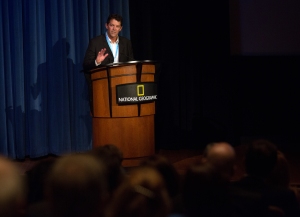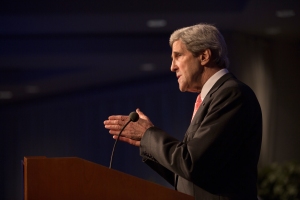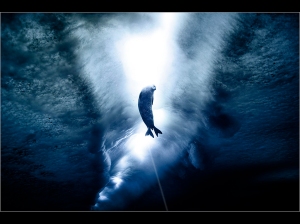Back in Christchurch I have time to reflect on my exciting week in Washington DC which included a screening of The Last Ocean at the National Museum of Natural History (as part of the DC Environmental Film Festival) and a private screening at National Geographic to members of the State Department, Ambassadors of CCAMLR nations and Environmental NGO’s.
Attending the latter event (but not the screening) was US Secretary of State John Kerry, the New Zealand Ambassador Mike Moore and the Australian Foreign Minister, Senator Rob Carr. All spoke about the Ross Sea and need for protecting this remarkable corner of the world. Having the US Secretary of State there was awesome but unfortunately there was no time for chitchat. On entering the room he was marched straight up to the stage where, following on from Rob Carr and Mike Moore, he delivered a 20-minute speech. It was his first talk on the oceans since being appointed Secretary of State and there was a great deal of political and media interest. I’m pleased to say much of it was centred on the Ross Sea.
He spoke of it being a living laboratory, a place of great importance for science and for peace and stability, and the Ross Sea MPA proposal quickly found its way into headlines around the world.
Coverage included many articles in the US, an article for the ABC in Australia and Khajeetimes in Dubai . I did an interview after the event for TVNZ’s Seven Sharp. You can see more news coverage on our website.
Sadly, the closest the Secretary of State got to the documentary was mentioning it – saying he hoped “the film would inspire people to be responsible stewards of this fragile planet.” John Kerry’s speech didn’t really divulge anything new about the proposed Ross Sea MPA, which is the same one presented to CCAMLR late last year. What was revealing, was the commitment the United States has towards establishing it. We saw that commitment with Kerry’s predecessor Hillary Clinton and it was very heartening to see it remain strong with John Kerry.
But without wanting to burst the DC bubble, we do need to put the event in context and remind ourselves that the commercial fishery in the Ross Sea remains. This fishery will reduce the adult Antarctic toothfish population by 50% – destroying forever the natural balance of the Ross Sea and our planet’s last vestige of an intact ocean ecosystem. None of this was mentioned by any of the politicians: like a dark secret that never surfaces, it’s something they know but prefer not to talk about. At its best, the MPA proposal is a decent step in the right direction, but there is a long way to go on this journey.
When I sat down with Dave Ainley and John Weller seven years ago and we decided to work together on the Last Ocean, the enormity of what we were hoping to achieve in a world that had never really heard of the Ross Sea was almost overwhelming. But if there is one thing I have learnt, it is to focus on one step at a time. I have also learnt to saviour the victories. In a journey full of setbacks and disappointments, it’s the victories that nourish you, encourage you and give you the energy to carry on. Washington was a victory. We had a high-profile political audience at the heart of Ross Sea debate and I was very to proud to have The Last Ocean be the catalyst in bringing them together, and bringing protection of the Ross Sea to world attention. It is a tribute to all who worked on the film.
Dave Ainley, the man who had started this whole thing rolling all those years ago, also attended the event. In my talk before the film’s screening I acknowledged his huge contribution – if it wasn’t for Dave, none of us would be here today. I also shared with the audience four things that had kept me going during the many times I had doubts about our ability to carry on.
1. A love for the Ross Sea and its wildlife and this unique and hidden corner of the world.
2. The integrity of the people campaigning to protect he Ross Sea.
3. A genuine concern about the kind of planet we will leave for our children
4. The belief that humanity could get its act together and actually protect the entire Ross Sea.
The screening capped off a thoroughly enjoyable few days in the Capital. I guess its payback for the endless hours of work – I just wish I could share some of these adventures and the amazing response the film receives with those who have put in so much in to this project.




I wish you all the best of luck with your fight to save the Ross Sea and it’s inhabitants.
The public screening at the Smithsonian Museum of Natural History on Saturday, March 16th, was attended by about 500 people (almost completely filled auditorium seating with many people standing at the back). The audience was clearly engaged in the film with bursts of applause occurring during the screening. Peter’s comments were thoughtful and inspiring. The public screening was a tremendous success. The challenge is to build on this 500 and grow that number into many thousands who will actively raise their voices in support of a Marine Protected Area that will truly protect the Ross Sea ecosystem. With such a foothold of ocean protection, we might have a glimmer of hope that such protections will also be adopted in other ocean regions to allow the slow process of recovery to begin for the entire ocean ecosystem. Congratulations to Peter, Dave, John and all the people who have contributed so much to The Last Ocean effort so far. Great and extremely important work!!